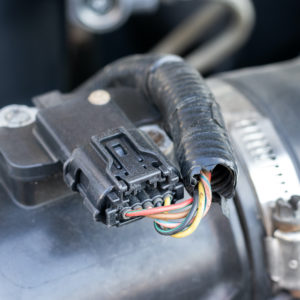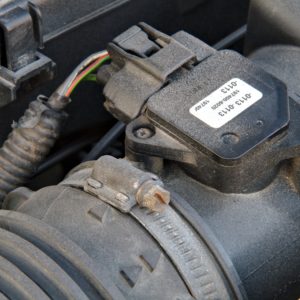Finding out what trouble codes mean is the first step to solving them. If this is your first time encountering the P2074 code, this guide can help you learn more about its definition, possible causes, and symptoms.
What Does the P2074 Code Mean?
Diagnostic trouble code (DTC) P2074 stands for “Manifold Absolute Pressure/Mass Air Flow – Throttle Position Correlation at Higher Load.” This code sets when the powertrain control module (PCM) detects that the signal from the manifold air pressure (MAP) or mass airflow (MAF) sensor doesn’t meet the expected values.
The mass air flow sensor or manifold air pressure sensor helps the PCM calculate how much fuel the engine needs, among other things.. The PCM monitors the throttle position and checks the MAF/MAP sensor’s readings compared to the throttle position to make sure they’re within the normal operating range.
This trouble code can affect your vehicle’s performance and fuel consumption. If you encounter this code, you might need to bring your vehicle to a shop for diagnosis and repair as soon as possible. Driving with this code is not advised.

Mass Airflow Sensor and Rationality Checks
The mass airflow sensor is a primary input on just about every platform since about 1992. Mass airflow sensors first appeared on domestic vehicles in the mid 1980s on some GM vehicles.
Engineers write algorithms into engine control software to do “rationality checks.” If, for example, the engine is believed to be at idle based on throttle position sensor input and the mass airflow input doesn’t increase when the ECM/PCM opens the idle air control valve to increase the idle speed, the ECM/PCM is programmed to flag that correlation failure.
Likewise, if the throttle position sensor indicates that the throttle plate is being opened but the mass airflow input doesn’t show a corresponding increase in airflow, that’s an anomaly that will set a code.
Code P2074 specifically flags a disagreement between MAF and throttle position when the engine load is high, such as when driving up a steep hill or pulling a heavy trailer. If the PCM sees that the throttle plate has been opened but the mass airflow hasn’t increased as expected, this code is set.

Note: The definition of code P2074 may be different depending on the vehicle manufacturer. Consult the appropriate repair manual or repair database for the exact code definition.
What are the Common Causes of the P2074 Code?
Many DTCs, including the P2074 code, have several possible causes. Below are some of the most common causes of P2074:
- Faulty MAF or MAP sensor
- Bad throttle position (TP) sensor
- Charge air cooler assembly failure
- Failed turbocharger
- Vacuum leak
- Internal engine problem
- Wiring issues
- An issue with the PCM, such as software in need of an update

What are the Common Symptoms of the P2074 Code?
When dealing with trouble codes, you might spot a few symptoms or none at all. Below are some of the common symptoms you might notice if you’re dealing with the P2074 code:
- Illuminated malfunction indicator lamp or check engine lamp
- Engine performance problems, such as poor acceleration, rough running and misfiring
- Increased fuel consumption
How to Diagnose the P2074 Code
Trouble codes share many possible symptoms, causes, and even areas of concern. Diving straight into repairs without a proper diagnosis might do more harm than good. That’s why thorough troubleshooting is important to fix codes like the P2074.
However, if you want to know more about the P2074 code, there are many automotive repair guides and resources available today. Of these materials, vehicle-specific repair manuals are your best choice because they have detailed repair and troubleshooting information, as well as helpful diagrams and illustrations.
Below is a video that explains the P2074 diagnostic process in more detail:
How to Fix the P2074 Code
Many trouble codes have several possible causes and by extension, probable solutions. In addition, different vehicle makers will have their own set of troubleshooting and repair procedures. What solves the P2074 code in a Ford F-250 might not fix the P2074 code in a Dodge Durango. There’s no “magic bullet” solution to fix trouble codes, and that includes the P2074.
Diagnosis and repair typically require special equipment and knowledge of DTCs. If you’re not confident in your trouble code repair know-how, it’s best to leave the job to professional mechanics and technicians. Doing so saves you time and effort, and helps you avoid costly mistakes down the line.
Where To Buy Parts to Fix the P2074 Code
The P2074 code is often a result of a malfunctioning MAF or MAP sensor. The engine performance problems and increased fuel consumption that accompanies this code can be a real pain. To resolve the code and prevent your vehicle from more issues, you might need to replace these sensors or something else in your vehicle’s system. For the parts you need for the repair, look no further than the catalog of high-quality parts at CarParts.com!
CarParts.com offers a wide selection of parts from the best aftermarket brands, with parts at different price points to suit your budget. At the same time, our 60-day return policy is in place to make sure you’re completely satisfied with your order. CarParts.com offers not only the convenience but the peace of mind for you to order online.
Make sure to replace the parts you need to get rid of that P2074 code. Browse our catalog and order your parts today!
Any information provided on this Website is for informational purposes only and is not intended to replace consultation with a professional mechanic. The accuracy and timeliness of the information may change from the time of publication.















